Australian National University Press is Australia’s first open-access university press. They specialise in publishing peer-reviewed research on a broad range of topics including Asia and Pacific studies, Australian politics, humanities, arts, Indigenous studies and science. Launched in 2004, ANU Press prides itself on its innovation in the area of open-access scholarship.
To find resources in this topic area, select the Subject search on the Advanced Search of the catalogue. For this particular subject, some of the search terms that will net you the largest number of relevant results are:

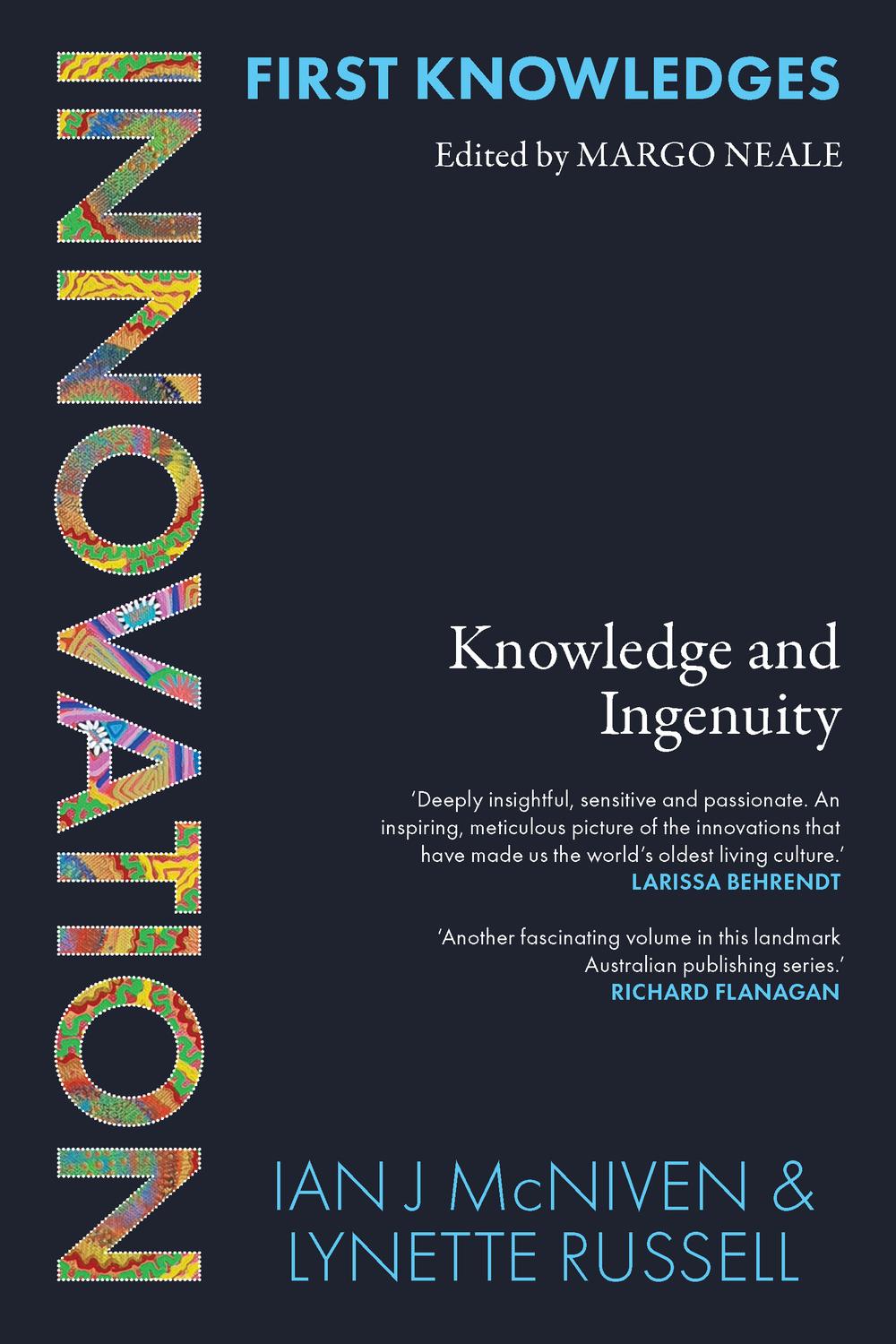 First Knowledges Innovation : Knowledge and Ingenuity
by
Ian J McNiven; Lynette Russell
Deeply insightful, sensitive and passionate. An inspiring, meticulous picture of the innovations that have made us the world's oldest living culture.' - Larissa Behrendt 'Another fascinating volume in this landmark Australian publishing series.' - Richard Flanagan What do you need to know to prosper as a people for at least 65,000 years? The First Knowledges series provides a deeper understanding of the expertise and ingenuity of Indigenous Australians. First Nations Australians are some of the oldest innovators in the world. Original developments in social and religious activities, trading strategies, technology and land-management are underpinned by philosophies that strengthen sustainability of Country and continue to be utilised today. Innovation: Knowledge and Ingenuity reveals novel and creative practices such as: body shaping; cremation; sea hunting with the help of suckerfish; building artificial reefs for oyster farms; repurposing glass from Europeans into spearheads; economic responses to colonisation; and a Voice to Parliament. In the first book to detail Indigenous innovations in Australia, Ian J McNiven and Lynette Russell showcase this legacy of First Nations peoples and how they offer resourceful ways of dealing with contemporary challenges that can benefit us all
First Knowledges Innovation : Knowledge and Ingenuity
by
Ian J McNiven; Lynette Russell
Deeply insightful, sensitive and passionate. An inspiring, meticulous picture of the innovations that have made us the world's oldest living culture.' - Larissa Behrendt 'Another fascinating volume in this landmark Australian publishing series.' - Richard Flanagan What do you need to know to prosper as a people for at least 65,000 years? The First Knowledges series provides a deeper understanding of the expertise and ingenuity of Indigenous Australians. First Nations Australians are some of the oldest innovators in the world. Original developments in social and religious activities, trading strategies, technology and land-management are underpinned by philosophies that strengthen sustainability of Country and continue to be utilised today. Innovation: Knowledge and Ingenuity reveals novel and creative practices such as: body shaping; cremation; sea hunting with the help of suckerfish; building artificial reefs for oyster farms; repurposing glass from Europeans into spearheads; economic responses to colonisation; and a Voice to Parliament. In the first book to detail Indigenous innovations in Australia, Ian J McNiven and Lynette Russell showcase this legacy of First Nations peoples and how they offer resourceful ways of dealing with contemporary challenges that can benefit us all
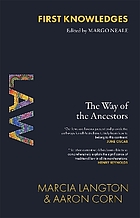 Law: the way of the ancestors
by
Marcia Langton; Aaron David Samuel Corn
"The First Knowledges series offers an introduction to Indigenous knowledges in vital areas and their application to the present day and the future. Exploring practices such as songlines, architecture, design, land management, botany, astronomy and law, this series brings together two very different ways of understanding the natural world: one ancient, the other modern. The sixth book focuses on law. Law is culture, and culture is law. Given by the ancestors and cultivated over millennia, Indigenous law defines what it is to be human. Complex and evolving, law holds the keys to resilient, caring communities and a life in balance with nature. Marcia Langton and Aaron Corn show how Indigenous law has enabled people to survive and thrive in Australia for more than 2000 generations. Nurturing people and places, law is the foundation of all Indigenous societies in Australia, giving them the tools to respond and adapt to major environmental and social changes. But law is not a thing of the past. These living, sophisticated systems are as powerful now as they have ever been, if not more so." -- Provided by publisher.
Law: the way of the ancestors
by
Marcia Langton; Aaron David Samuel Corn
"The First Knowledges series offers an introduction to Indigenous knowledges in vital areas and their application to the present day and the future. Exploring practices such as songlines, architecture, design, land management, botany, astronomy and law, this series brings together two very different ways of understanding the natural world: one ancient, the other modern. The sixth book focuses on law. Law is culture, and culture is law. Given by the ancestors and cultivated over millennia, Indigenous law defines what it is to be human. Complex and evolving, law holds the keys to resilient, caring communities and a life in balance with nature. Marcia Langton and Aaron Corn show how Indigenous law has enabled people to survive and thrive in Australia for more than 2000 generations. Nurturing people and places, law is the foundation of all Indigenous societies in Australia, giving them the tools to respond and adapt to major environmental and social changes. But law is not a thing of the past. These living, sophisticated systems are as powerful now as they have ever been, if not more so." -- Provided by publisher.
 Aboriginal spirituality : past, present, future
by
Anne Pattel-Gray
Collection of essays from the first national conference on Aboriginality and perceptions of Christianity, held in 1990. Explores spirituality in relation to Christianity and discusses Aboriginal spirituality and the Gospel and the value of Aboriginal culture. Includes references. Contributors include Galarrway Yunupingu and Djiniyini Gondarra. The editor is the founder of the Aboriginal and Islander Commission of the National Council of Churches in Australia. Her other works include 'Through Aboriginal Eyes' and 'The Great White Flood'.
Source: Publisher
Aboriginal spirituality : past, present, future
by
Anne Pattel-Gray
Collection of essays from the first national conference on Aboriginality and perceptions of Christianity, held in 1990. Explores spirituality in relation to Christianity and discusses Aboriginal spirituality and the Gospel and the value of Aboriginal culture. Includes references. Contributors include Galarrway Yunupingu and Djiniyini Gondarra. The editor is the founder of the Aboriginal and Islander Commission of the National Council of Churches in Australia. Her other works include 'Through Aboriginal Eyes' and 'The Great White Flood'.
Source: Publisher
 Anaditj
by
Denise Champion and Rosemary Dewerse
One of the reasons I want to write this book is because I don't sit easily with Western theology. It is so different to my Adnyamathanha understanding of Anaditj, the way things are. There's a much older story that has stood the test of time in this land of the universal Christ and the birth of the universal church that is not being acknowledged. As Aboriginal peoples we hold knowledge, understanding, and wisdom that not only our own, but all peoples, need to learn from -- language for God, wisdom for God's people, and challenge for the way ahead. For the the church to be complete, our voices must be heard.
Anaditj
by
Denise Champion and Rosemary Dewerse
One of the reasons I want to write this book is because I don't sit easily with Western theology. It is so different to my Adnyamathanha understanding of Anaditj, the way things are. There's a much older story that has stood the test of time in this land of the universal Christ and the birth of the universal church that is not being acknowledged. As Aboriginal peoples we hold knowledge, understanding, and wisdom that not only our own, but all peoples, need to learn from -- language for God, wisdom for God's people, and challenge for the way ahead. For the the church to be complete, our voices must be heard.
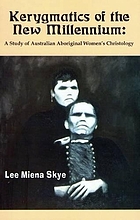 Kerygmatics of the new millennium : a study of Australian Aboriginal women's Christology
by
Lee Miena Skye
Kerygmatics of the new millennium : a study of Australian Aboriginal women's Christology
by
Lee Miena Skye
 Anaditj
by
Denise Champion
One of the reasons I want to write this book is because I don't sit easily with Western theology. It is so different to my Adnyamathanha understanding of Anaditj, the way things are. There's a much older story that has stood the test of time in this land of the universal Christ and the birth of the universal church that is not being acknowledged. As Aboriginal peoples we hold knowledge, understanding, and wisdom that not only our own, but all peoples, need to learn from -- language for God, wisdom for God's people, and challenge for the way ahead. For the the church to be complete, our voices must be heard.
Anaditj
by
Denise Champion
One of the reasons I want to write this book is because I don't sit easily with Western theology. It is so different to my Adnyamathanha understanding of Anaditj, the way things are. There's a much older story that has stood the test of time in this land of the universal Christ and the birth of the universal church that is not being acknowledged. As Aboriginal peoples we hold knowledge, understanding, and wisdom that not only our own, but all peoples, need to learn from -- language for God, wisdom for God's people, and challenge for the way ahead. For the the church to be complete, our voices must be heard.
 Australian indigenous knowledge and libraries
by
Martin N NakataState Library of New South Wales.Australian Institute of Aboriginal and Torres Strait Islander Studies.Libraries and Indigenous Knowledge: a National Forum for Libraries, Archives & Information Services
Present[s] an insight into the breadth and depth of Indigenous knowledge issues which impact on libraries and archives. Presentations adressed a range of issues to do with understanding the importance of retaining and valuing Indigenous Knowledge in Australia and internationally ..."--Foreword, p. [1].
Australian indigenous knowledge and libraries
by
Martin N NakataState Library of New South Wales.Australian Institute of Aboriginal and Torres Strait Islander Studies.Libraries and Indigenous Knowledge: a National Forum for Libraries, Archives & Information Services
Present[s] an insight into the breadth and depth of Indigenous knowledge issues which impact on libraries and archives. Presentations adressed a range of issues to do with understanding the importance of retaining and valuing Indigenous Knowledge in Australia and internationally ..."--Foreword, p. [1].
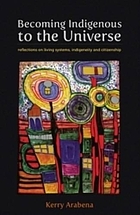 Becoming indigenous to the universe : reflections on living systems, indigeneity and citizenship
by
Kerry Arabena
Kerry Arabena opens doors to unexplored ethical possibilities for living in 21st century. Converging wisdom from Indigenous peoples philosophic traditions with scientific and ethical understandings of contemporary modern thought has yielded new understanding of our universal indigeneity, citizenship and our place in living systems.
Becoming indigenous to the universe : reflections on living systems, indigeneity and citizenship
by
Kerry Arabena
Kerry Arabena opens doors to unexplored ethical possibilities for living in 21st century. Converging wisdom from Indigenous peoples philosophic traditions with scientific and ethical understandings of contemporary modern thought has yielded new understanding of our universal indigeneity, citizenship and our place in living systems.
 Cultural Adaptation of the Liturgy
by
Anscar J. Chupungco
Cultural Adaptation of the Liturgy
by
Anscar J. Chupungco
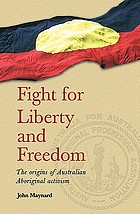 Fight for Liberty and Freedom : the origins of Australian Aboriginal activism
by
John Maynard
Opposition to the British colonisation of Australia did not spring from the Mabo decision or the Native Title Act, nor was it born in the vibrant 1960s, which culminated in the famous tent embassy in 1972. Rather, the first politically organised and united all-Aboriginal activist group was the Australian Aboriginal Progressive Association (AAPA), begun in 1924 under the leadership of Frederick Maynard. For the first time Aboriginal people voiced their disapproval in public in a well-organised way. They opened offices in Sydney, held street rallies. conducted public meetings, gained newspaper coverage, wrote letters and petitions to Government at all levels, and collaborated with the international black labor movement. The AAPA's demands resonate today. They centred on Aboriginal rights to land, stopping Aboriginal children being taken from their families, the acquisition of citizenship rights, and defending a distinct Aboriginal cultural identity. This form of resistance and organised action has now endured for more than seventy years and through a detailed exploration of the life of his grandfather, John Maynard reveals the AAPA's invaluable legacy.
Fight for Liberty and Freedom : the origins of Australian Aboriginal activism
by
John Maynard
Opposition to the British colonisation of Australia did not spring from the Mabo decision or the Native Title Act, nor was it born in the vibrant 1960s, which culminated in the famous tent embassy in 1972. Rather, the first politically organised and united all-Aboriginal activist group was the Australian Aboriginal Progressive Association (AAPA), begun in 1924 under the leadership of Frederick Maynard. For the first time Aboriginal people voiced their disapproval in public in a well-organised way. They opened offices in Sydney, held street rallies. conducted public meetings, gained newspaper coverage, wrote letters and petitions to Government at all levels, and collaborated with the international black labor movement. The AAPA's demands resonate today. They centred on Aboriginal rights to land, stopping Aboriginal children being taken from their families, the acquisition of citizenship rights, and defending a distinct Aboriginal cultural identity. This form of resistance and organised action has now endured for more than seventy years and through a detailed exploration of the life of his grandfather, John Maynard reveals the AAPA's invaluable legacy.
 God's own country? : the Anglican Church and Tasmanian Aborigines
by
James Boyce
God's own country? : the Anglican Church and Tasmanian Aborigines
by
James Boyce
 Jesus and the Dreaming: Discovering an Australian Spirituality Through Aboriginal-Christian Dialogue
by
Frank Fletcher MSC
This book traces how an Australian Catholic priest's encounter with Aboriginal people forced him to confront the challenges and possibilities that Aboriginal spirituality present to western Christianity.
Fr Fletcher argues that in addition to a more authentic dialogue, a sympathetic understanding of the Dreaming will deepen our own religious experience and help renew modern Christian theology.
Jesus and the Dreaming: Discovering an Australian Spirituality Through Aboriginal-Christian Dialogue
by
Frank Fletcher MSC
This book traces how an Australian Catholic priest's encounter with Aboriginal people forced him to confront the challenges and possibilities that Aboriginal spirituality present to western Christianity.
Fr Fletcher argues that in addition to a more authentic dialogue, a sympathetic understanding of the Dreaming will deepen our own religious experience and help renew modern Christian theology.
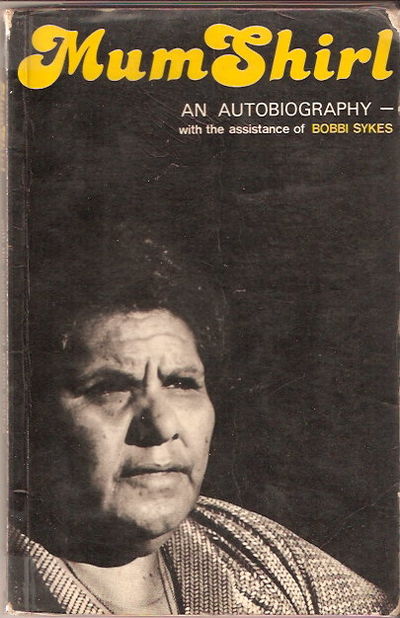 MumShirl : an autobiography
by
MumShirl, Bobbi Sykes
Mum Shirls early life at Cowra with details of life at Erambie Mission; her later life and work in Sydney with particular emphasis on her assistance to Aboriginal prisoners and her involvement in the Aboriginal Medical Service.
MumShirl : an autobiography
by
MumShirl, Bobbi Sykes
Mum Shirls early life at Cowra with details of life at Erambie Mission; her later life and work in Sydney with particular emphasis on her assistance to Aboriginal prisoners and her involvement in the Aboriginal Medical Service.
 The need for roots : a prelude to a declaration of duties towards mankind
by
Simone Weil
The need for roots : a prelude to a declaration of duties towards mankind
by
Simone Weil
 New, Old and Timeless : Pointers Towards an Aboriginal Theology
by
Wilson, Martin J.
New, Old and Timeless : Pointers Towards an Aboriginal Theology
by
Wilson, Martin J.
 Our mob, God's story : Aboriginal and Torres Strait Islander artists share their faith
by
Louise Sherman and Christobel Mattingley
Bible Society Australia. Our Mob, God's Story : Aboriginal and Torres Strait Islander Artists Share Their Faith. Edited by Louise Sherman and Christobel Mattingley. Sydney: Bible Society Australia, 2017.
Our mob, God's story : Aboriginal and Torres Strait Islander artists share their faith
by
Louise Sherman and Christobel Mattingley
Bible Society Australia. Our Mob, God's Story : Aboriginal and Torres Strait Islander Artists Share Their Faith. Edited by Louise Sherman and Christobel Mattingley. Sydney: Bible Society Australia, 2017.
 Plants : past, present and future
by
Zena Cumpston; Michael-Shawn Fletcher; Lesley Head
What do you need to know to prosper as a people for at least 65,000 years? The First Knowledges series provides a deeper understanding of the expertise and ingenuity of Indigenous Australians. Plants are the foundation of life on Earth. Aboriginal and Torres Strait Islander peoples have always known this to be true. For millennia, reciprocal relationships with plants have provided both sustenance to Indigenous communities and many of the materials needed to produce a complex array of technologies. Managed through fire and selective harvesting and replanting, the longevity and intricacy of these partnerships are testament to the ingenuity and depth of Indigenous first knowledges. Plants: Past, Present and Future celebrates the deep cultural significance of plants and shows how engaging with this heritage could be the key to a healthier, more sustainable future.
Plants : past, present and future
by
Zena Cumpston; Michael-Shawn Fletcher; Lesley Head
What do you need to know to prosper as a people for at least 65,000 years? The First Knowledges series provides a deeper understanding of the expertise and ingenuity of Indigenous Australians. Plants are the foundation of life on Earth. Aboriginal and Torres Strait Islander peoples have always known this to be true. For millennia, reciprocal relationships with plants have provided both sustenance to Indigenous communities and many of the materials needed to produce a complex array of technologies. Managed through fire and selective harvesting and replanting, the longevity and intricacy of these partnerships are testament to the ingenuity and depth of Indigenous first knowledges. Plants: Past, Present and Future celebrates the deep cultural significance of plants and shows how engaging with this heritage could be the key to a healthier, more sustainable future.
 Tiddas talking business
by
Anne Pattel-Gray
This book comes at a critical time in the empowerment of aboriginal Christian women, as they begin to define for themselves the world in which they live, to name their oppressors, and to challenge the Christian Feminist Movement about its racism and participation in their subjugation. For aboriginal women to speak of their own experience of life and view of history as a source of empowerment to themselves, and to determine the meaning of their Christian faith and its expression, has seen aboriginal tiddas (sisters) on the move, claiming their place in the struggle for freedom. (From Publisher)
Tiddas talking business
by
Anne Pattel-Gray
This book comes at a critical time in the empowerment of aboriginal Christian women, as they begin to define for themselves the world in which they live, to name their oppressors, and to challenge the Christian Feminist Movement about its racism and participation in their subjugation. For aboriginal women to speak of their own experience of life and view of history as a source of empowerment to themselves, and to determine the meaning of their Christian faith and its expression, has seen aboriginal tiddas (sisters) on the move, claiming their place in the struggle for freedom. (From Publisher)
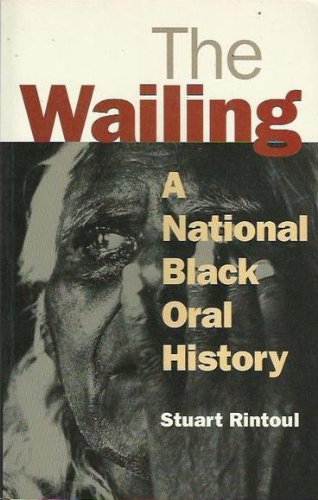 The wailing : a national black oral history
by
Stuart Rintoul
The wailing : a national black oral history
by
Stuart Rintoul
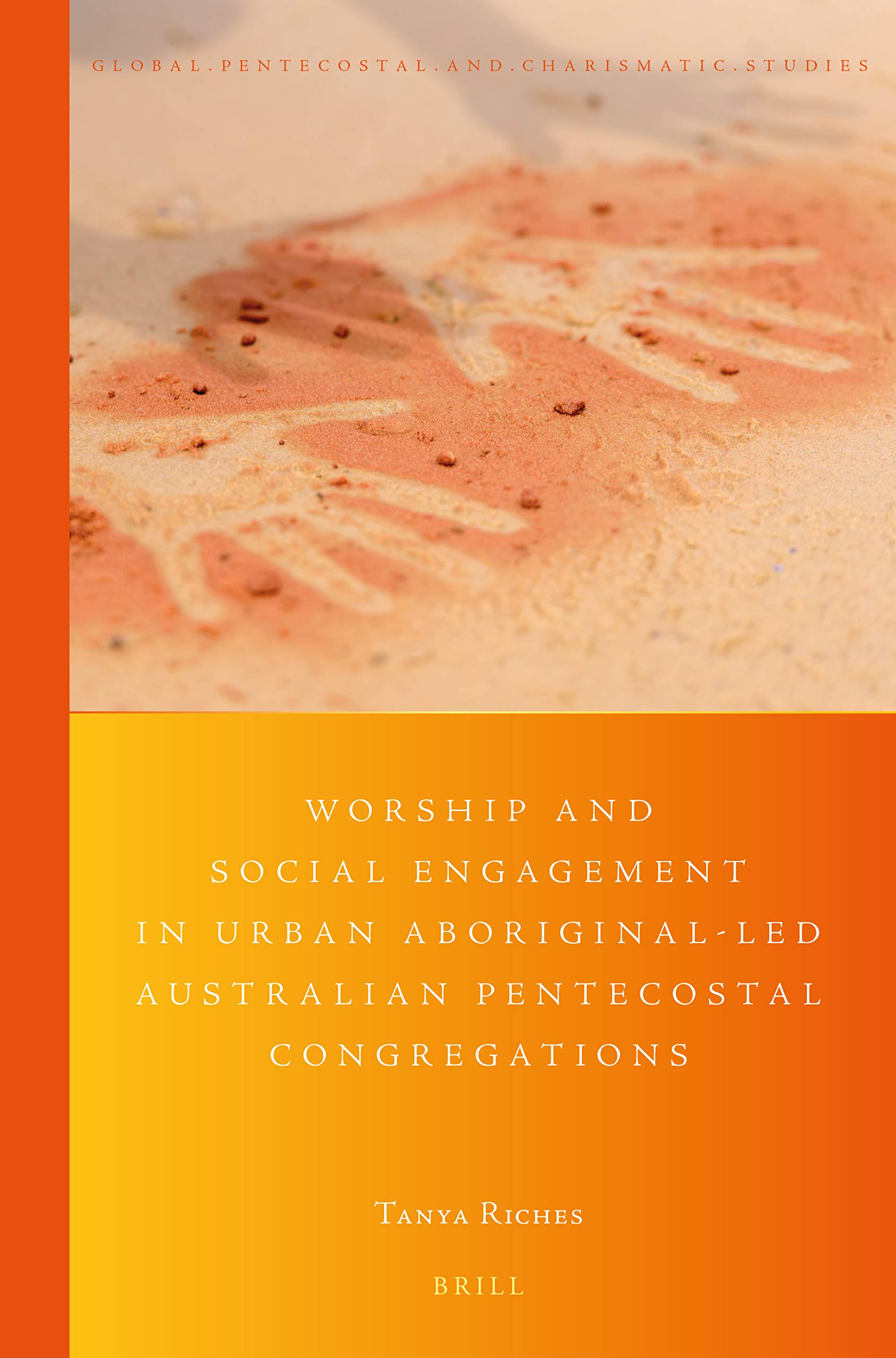 Worship and Social Engagement in Urban Aboriginal-Led Australian Pentecostal Congregations
by
Tanya Riches
Worship and Social Engagement in Urban Aboriginal-led Australian Pentecostal Congregations: (Re)imagining Identity in the Spirit provides an ethnographic account of three Australian Pentecostal congregations with Aboriginal senior leadership. Within this Pentecostalism, Dreaming realities and identities must be brought together with the Christian gospel. Yet current political and economic relationships with the Australian state complicate the possibilities of interactions between culture and Spirit. The result is a matrix or network of these churches stretching across Australia, with Black Australian Pentecostals resisting and accommodating the state through the construction of new and ancient identities. This work occurs most notably in context of the worship ritual, which functions through ritual interaction chains to energise the various social engagement programs these congregations sustain.
Worship and Social Engagement in Urban Aboriginal-Led Australian Pentecostal Congregations
by
Tanya Riches
Worship and Social Engagement in Urban Aboriginal-led Australian Pentecostal Congregations: (Re)imagining Identity in the Spirit provides an ethnographic account of three Australian Pentecostal congregations with Aboriginal senior leadership. Within this Pentecostalism, Dreaming realities and identities must be brought together with the Christian gospel. Yet current political and economic relationships with the Australian state complicate the possibilities of interactions between culture and Spirit. The result is a matrix or network of these churches stretching across Australia, with Black Australian Pentecostals resisting and accommodating the state through the construction of new and ancient identities. This work occurs most notably in context of the worship ritual, which functions through ritual interaction chains to energise the various social engagement programs these congregations sustain.